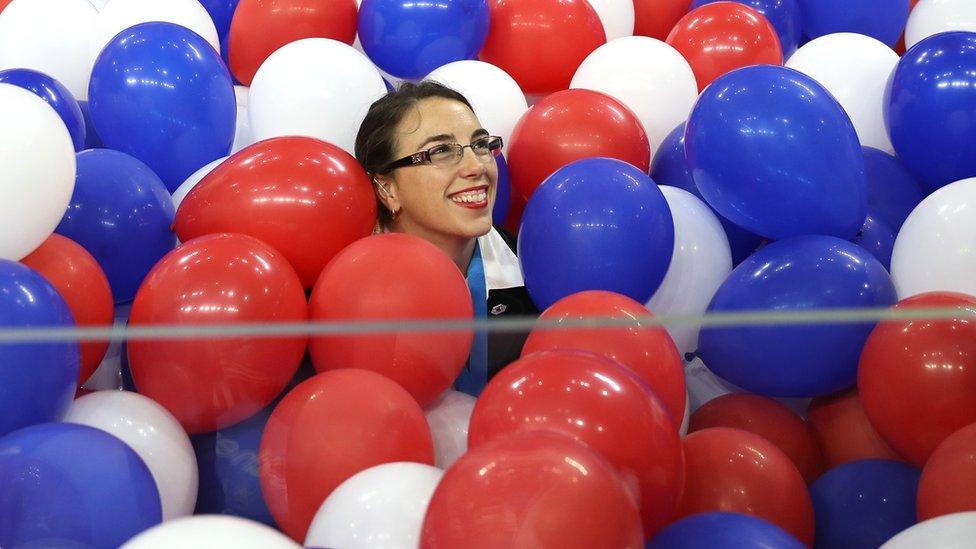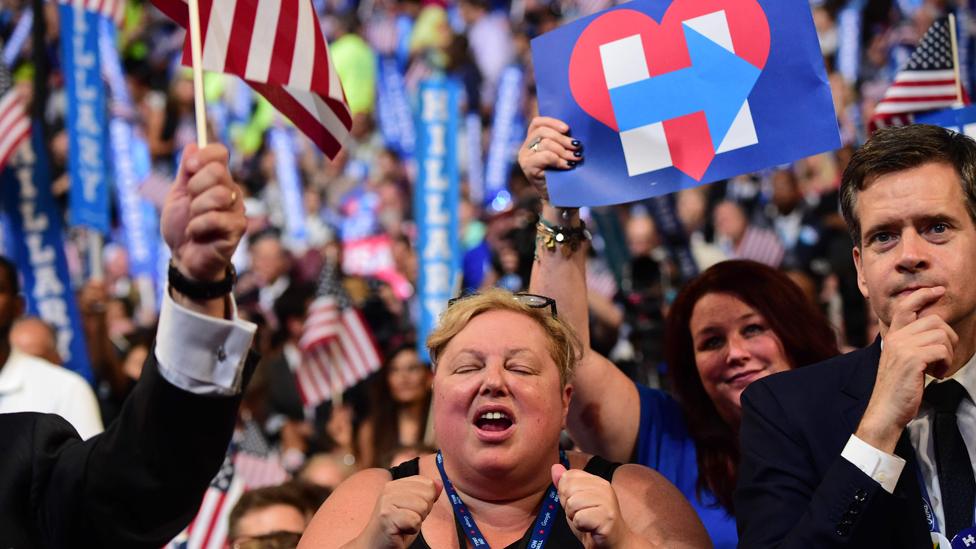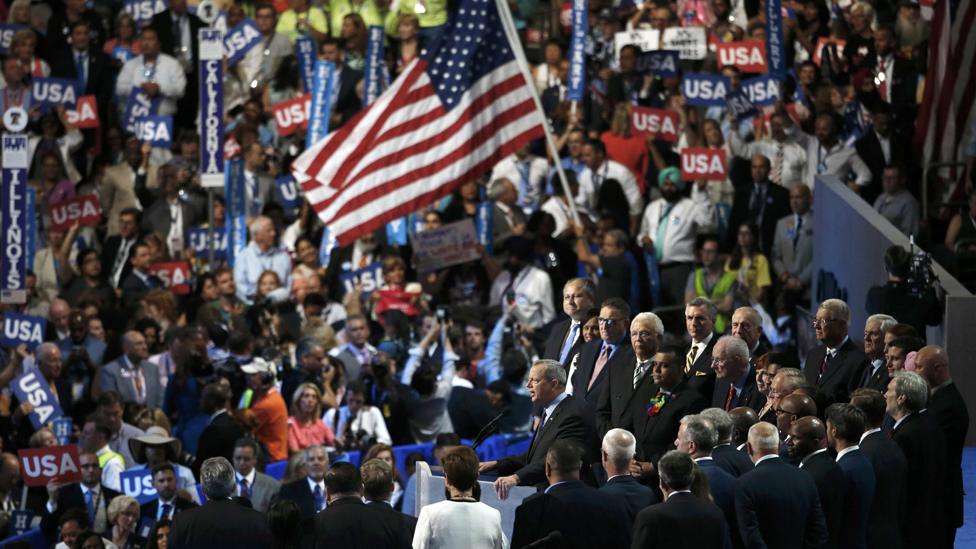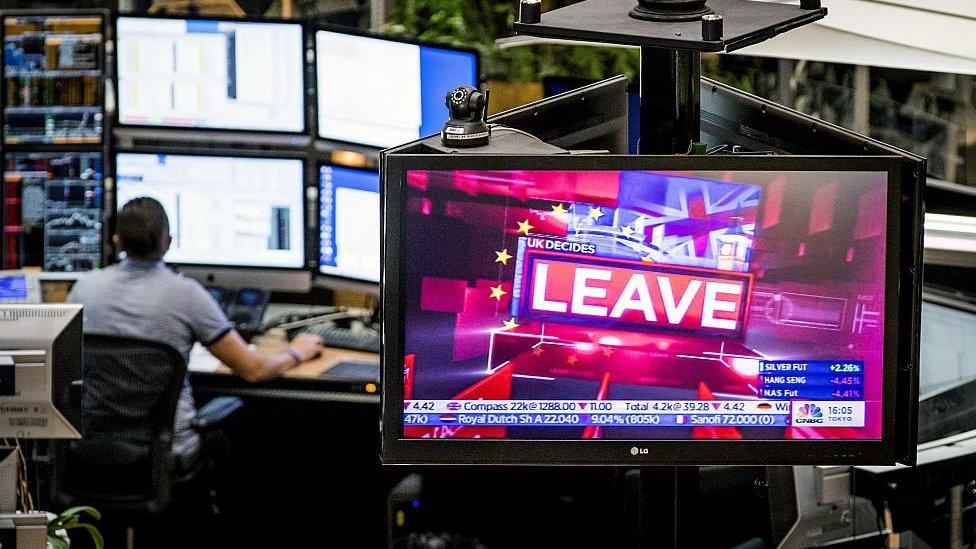US election: Are the Democrats too confident?
- Published
Party divisions as ‘rabble’ find voice
My overriding impression from four days of the convention in Philadelphia is just how confident the Democrats are about this election.
Both on and off the record, sensible, reliable party stalwarts seem remarkably sure that Hillary Clinton will win in November, and possibly win big.
Here's their case.
The argument in favour of Donald Trump, as Democrats recognise, is that the gravitational force of this election is a desire for change.
In this atmosphere, Mrs Clinton suffers from being the ultimate establishment figure.
But Democrats believe that the forces in Clinton's favour are significantly stronger.
First, she has demographics tilting her way. The sectors of the American population that are growing - non-white people - tend to vote Democrat.
The sector that is shrinking - white men - tend to vote Republican. I heard a lot this week about the natural Democratic coalition. So far there's little indication that Mr Trump has been able to make much inroads into non-white voting groups.

Second, she is much better organised than Donald Trump. The Democratic convention was a show case of strong speakers, excellent stage craft and word perfect messaging.
And the convention reflects the campaign more broadly. Mrs Clinton has more money, more staff and a better turn-out operation than her opponent.
He barely has a campaign structure to speak of.
As one election veteran put it, it's really hard to get elected president and you need a first-class machine to even have a hope.
That message could be particularly true this year.
Judging by the way they are talking, both campaigns appear to have decided that there is not much crossover in the groups they appeal to.
There aren't very many people left to persuade. In which case the best chance of winning is to make sure their supporters actually turn out - and one of the best ways to do that is to instil in them the fear of God about the other candidate.
Expect to hear a lot this campaign about how lying Hillary will allow so-called Islamic State to take over America, and how Trump with the nuclear codes is a terrifying prospect.

Having thoroughly scared their bases, the parties then need to get them to the polls.
That's where Democrats think that this election their superior operation will give them a big advantage.
Third, luck helps in politics. People on the Clinton campaign believe Trump is simply unelectable.
David Plouffe, the man responsible for Obama's victory in 2012, has said that in this cycle, Trump is the candidate he dreamed about running against.
And they believe that the more Mr Trump appears to upend Nato or cosy up to Russia, the more unelectable he makes himself.
It was no coincidence that on Thursday night a string of veterans and generals took the stage in Philadelphia.

General John Allen (centre) leads a group of veterans on stage at the DNC
It was a hawkish display of US global intervention, complete with chants of "USA! USA!" that sometimes felt more like a Republican convention than a Democratic one.
On the issue of national security, the Clinton campaign has set up tent in what is traditionally Republican territory. I wouldn't be surprised if General Colin Powell doesn't come out soon and endorse Hillary Clinton.
All this gives Democrats an air of quiet, but unmistakable confidence about their chances in November.
But there are hurdles they may be underestimating.
So far Mr Trump has rewritten conventional political rules and made issues like organisation and demographics seem less significant.
He may continue to do so between now and November.
It is hard to tell just how strong that desire for change is. Is it a tidal wave that means no one with a long political background could get elected - especially no one who is as much a part of the traditional establishment as Hillary?

Another surprise?
The US is not the UK, but Brexit showed that the promise of change can be a powerful force these days.
Few people in the British establishment thought Britain would really vote to leave the EU. Even in the Leave campaign didn't really think it would happen.
Democrats, by the way, think that now the conventions are over, people will shift from the angry protest mode to a sober decision mode. Polls over the next few weeks should tell us if that's the case.
Three reasons Hillary could lose
The Clinton campaign elite that partied at the convention tends to live and operate in the rarefied world of the east and west coasts of the US. They don't spend a lot of time in the small towns of Ohio, Pennsylvania and Virginia that will decide this election.
These are towns where a lot of people hate Hillary Clinton, really, really hate her. They may be underestimating the strength of that antipathy.
The Democrats are confident, they'd do well not to get cocky.